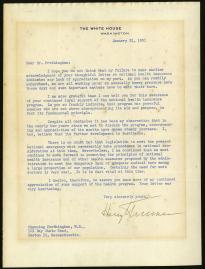The Health Care Debate in 1951
Posted by Sandra Trenholm on Friday, 07/14/2017
The Gilder Lehrman Institute of American History recently acquired a letter from President Harry Truman to Dr. Channing Frothingham of Boston. In this letter, written in 1951, the President thanked Channing for his support of Truman’s plan for national health insurance.

I am more grateful than I can tell you for this assurance of your continued loyal support of the national health insurance program. As you so frankly indicate, that program has powerful enemies who are not above misrepresenting its aim and purpose, in fact its fundamental principle.
Despite all obstacles it has been my observation that in the nearly two years since we met to discuss the program, understanding and appreciation of its merits have shown steady increase. I, too, believe that its further development is inevitable.
There is no doubt but that legislation to meet the present national emergency must necessarily take precedence in national consideration at this time. Nevertheless, I am convinced that we must continue to move forward in promoting the principles of national health insurance and of other health measures proposed by the administration to meet the dangerous lack of adequate medical care among a large proportion of our population. Certainly the need for more doctors is very real.
Truman had introduced his health care plan on November 19, 1945. He cited the millions of Americans who had been excused from military service due to health issues. His plan was to encourage more doctors and nurses to work in rural areas and to create a federally administered national health insurance fund. Truman’s proposal went to Congress in a Social Security expansion bill co-sponsored by Senators Robert Wagner and James Murray and Representative John Dingell. The Wagner-Murray-Dingell Bill faced opposition in Congress and from the American Medical Association. By 1951 Truman recognized that, with the crisis of the Korean War and a national reaction against the New Deal programs, he was not going to get his program through Congress. He dropped the program from his 1952 State of the Union address, but established a Commission on the Health Needs of the Nation to study the issue.